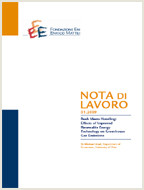Trust and Manipulation in Social Networks

30.04.2014
Manuel Förster, Ana Mauleon, Vincent J. Vannetelbosch
D83, D85, Z13
Social networks, Trust, Manipulation, Opinion leadership, Consensus, Wisdom of Crowds
Climate Change and Sustainable Development
Carlo Carraro
We investigate the role of manipulation in a model of opinion formation. Agents repeatedly communicate with their neighbors in the social network, can exert effort to manipulate the trust of others, and update their opinions about some common issue by taking weighted averages of neighbors’ opinions. The incentives to manipulate are given by the agents’ preferences. We show that manipulation can modify the trust structure and lead to a connected society. Manipulation fosters opinion leadership, but the manipulated agent may even gain influence on the long-run opinions. Finally, we investigate the tension between information aggregation and spread of misinformation.
***
Suggested citation: Förster, M., A. Mauleon, V. J. Vannetelbosch, (2014), ‘Trust and Manipulation in Social Networks’ Nota di Lavoro 50.2014, Milan, Italy: Fondazione Eni Enrico Mattei.
